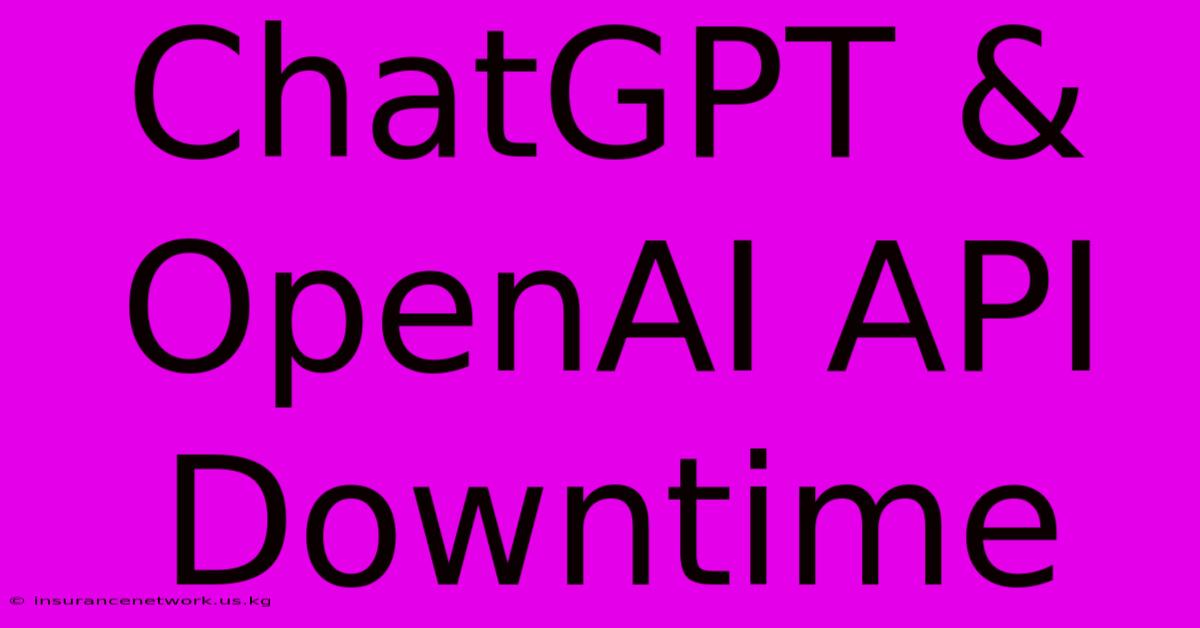ChatGPT & OpenAI API Downtime

Discover more detailed and exciting information on our website. Click the link below to start your adventure: Visit Best Website insurancenetwork.us.kg. Don't miss out!
Table of Contents
ChatGPT & OpenAI API Downtime: Causes, Impacts, and Solutions
ChatGPT, the revolutionary AI chatbot, and the OpenAI API, its powerful underlying technology, are transforming how we interact with technology. However, like any online service, they experience occasional downtime. This article delves into the causes, impacts, and potential solutions surrounding ChatGPT and OpenAI API outages.
Understanding ChatGPT and OpenAI API Downtime
Downtime refers to periods when the ChatGPT service or the OpenAI API becomes unavailable or inaccessible to users. This can manifest in various ways, including:
- Complete unavailability: Users cannot access ChatGPT or utilize the API at all.
- Partial unavailability: Certain features might be unavailable, while others remain functional.
- Slow response times: The service might be operational but significantly slower than usual.
These disruptions can significantly impact users, particularly those who rely on these services for critical tasks.
Causes of Downtime
Several factors contribute to ChatGPT and OpenAI API downtime:
- High demand: Surges in user traffic can overwhelm the servers, leading to temporary unavailability. Popular trends or viral moments often cause this.
- Server maintenance: Scheduled maintenance is necessary to ensure optimal performance and stability. OpenAI typically announces these planned outages in advance.
- Technical issues: Unexpected technical problems, such as bugs, software glitches, or hardware failures, can lead to unplanned downtime.
- Cyberattacks: While less common, security breaches or distributed denial-of-service (DDoS) attacks can disrupt service.
- Network problems: Issues with internet connectivity or network infrastructure can prevent access.
Impact of Downtime
The impact of ChatGPT and OpenAI API downtime varies depending on the users and their applications:
- Businesses: Companies relying on the OpenAI API for their products or services can face revenue loss and reputational damage during outages.
- Developers: Developers using the API for their projects experience delays and disruptions in their workflows.
- Individual users: Users miss out on the opportunity to use ChatGPT for tasks such as writing, coding, or creative projects.
The severity of the impact also depends on the duration of the downtime. Short interruptions may be manageable, but prolonged outages can have serious consequences.
Solutions and Mitigation Strategies
While OpenAI works diligently to minimize downtime, users and developers can employ strategies to mitigate the impact:
- Monitor status pages: Regularly check OpenAI's official status page for updates on service availability.
- Implement error handling: Developers should build error handling mechanisms into their applications to gracefully handle API unavailability.
- Use caching mechanisms: Caching responses from the API can reduce reliance on real-time access, minimizing the impact of short outages.
- Diversify API usage: If possible, using multiple APIs or alternative solutions can provide redundancy.
- Plan for downtime: Businesses and developers should plan for potential downtime and develop contingency plans.
Staying Informed
OpenAI usually communicates service disruptions through their official channels, including their website, social media, and email updates. Staying informed about these announcements is crucial for users and developers to prepare for and manage potential downtime.
Conclusion: Minimizing the Disruption
ChatGPT and the OpenAI API are valuable tools, but their susceptibility to occasional downtime is a reality. By understanding the causes and impacts of these outages and implementing appropriate mitigation strategies, users and developers can minimize disruption and ensure continued productivity and service availability. OpenAI's commitment to improving service reliability is a key factor in maintaining user trust and maximizing the potential of these powerful AI technologies.

Thank you for visiting our website wich cover about ChatGPT & OpenAI API Downtime. We hope the information provided has been useful to you. Feel free to contact us if you have any questions or need further assistance. See you next time and dont miss to bookmark.
Featured Posts
-
Geno Smiths 16 Yard Scramble
Dec 27, 2024
-
Bridgewater Signs With Detroit Lions
Dec 27, 2024
-
Nwosu Sacks Williams 14 Yard Loss
Dec 27, 2024
-
Chat Gpt Down Open Ai Chatbot Offline
Dec 27, 2024
-
Wolves Beat Man Utd 2 0 Final Score
Dec 27, 2024
